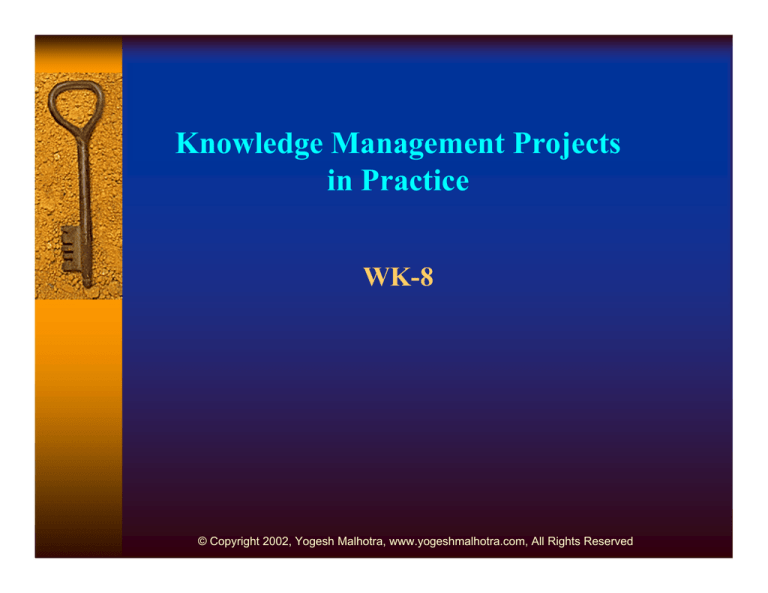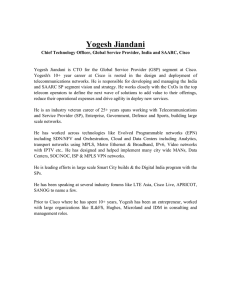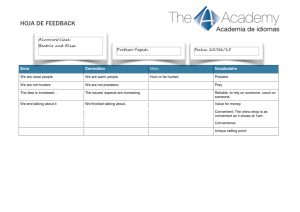
Knowledge Management Projects
in Practice
WK-8
© Copyright 2002, Yogesh Malhotra, www.yogeshmalhotra.com, All Rights Reserved
© Copyright 2002, Yogesh Malhotra, www.yogeshmalhotra.com, All Rights Reserved
© Copyright 2002, Yogesh Malhotra, www.yogeshmalhotra.com, All Rights Reserved
© Copyright 2002, Yogesh Malhotra, www.yogeshmalhotra.com, All Rights Reserved
© Copyright 2002, Yogesh Malhotra, www.yogeshmalhotra.com, All Rights Reserved
© Copyright 2002, Yogesh Malhotra, www.yogeshmalhotra.com, All Rights Reserved
© Copyright 2002, Yogesh Malhotra, www.yogeshmalhotra.com, All Rights Reserved
© Copyright 2002, Yogesh Malhotra, www.yogeshmalhotra.com, All Rights Reserved
Epitaph: Ex-Post Analysis: Orbital / Sopheon
• Knowledge management is the ongoing
creation, capture, preservation, and
management of information. This gives
employees, customers, partners, and
companies the resources needed to be more
efficient and productive. ?????
© Copyright 2002, Yogesh Malhotra, www.yogeshmalhotra.com, All Rights Reserved
KM Projects in Practice
• KM world of budgets, deadlines, politics,
•
•
•
•
•
•
culture, leadership
People, technology, processes, K
KM project as unit of analysis ???
31 different projects, 20 different firms
4 firms visited, rest telephone interviews
High level typology of KM projects
Success factors for w-I-p KM projects
© Copyright 2002, Yogesh Malhotra, www.yogeshmalhotra.com, All Rights Reserved
Types of KM Projects
Knowledge repositories
Improve K access
Improve K culture and environment
What do you think???
How does this relate to 10-step KM???
How does this relate to the Performance
Oriented Paradigm of KM
• What is the state of KM world today???
•
•
•
•
•
•
© Copyright 2002, Yogesh Malhotra, www.yogeshmalhotra.com, All Rights Reserved
KM for Whitewaters
Dimensions of KM Performance
Increasing Returns
Lo Structure
From
Hi Structure
to Lo
Structure
Hi Structure
Stable
‘White Waters’
From
Stable to ‘White Waters’
(Speed, Range)
From
Routine to Non-Routine
Non-Routine
© Copyright 2002, Yogesh Malhotra, www.yogeshmalhotra.com, All Rights Reserved
K Repositories – K as “it”
• External K – for CI or BI
• Structured internal K
• Informal internal K
• Extracting Tacit K – Community solutions
and lessons learned solutions (discussed in
previous sessions)
What is the current state of above three???
© Copyright 2002, Yogesh Malhotra, www.yogeshmalhotra.com, All Rights Reserved
K Access and Transfer
• Story of Teltech
• What was their business model?
• How did they incentivize K sharing?
• What can you learn from them????
• Where is the state of KM World today???
© Copyright 2002, Yogesh Malhotra, www.yogeshmalhotra.com, All Rights Reserved
K Environment
• Skandia and its internal audit
• Other companies – know what we know but
we don’t know that we know
• External, internal, bridge goals of K
processes
• Relate to CRM, ERP, SCM, etc.
© Copyright 2002, Yogesh Malhotra, www.yogeshmalhotra.com, All Rights Reserved
Success and Measurement
• How much more funding for KM?
• How much use and volume of K?
• Accumulation of critical mass and top level
support
• Comfort with K and KM ????
• Evidence of some ‘returns’ – financial ???
© Copyright 2002, Yogesh Malhotra, www.yogeshmalhotra.com, All Rights Reserved
Success Factors of KM
•
•
•
•
•
•
•
•
K-oriented culture ???
Technical and organizational infrastructure
Senior management support
Link to economic or industry “VALUE” ??
Process orientation
Nontrivial motivation aids ???
Some level of K structure
Multiple channels of K transfer.
© Copyright 2002, Yogesh Malhotra, www.yogeshmalhotra.com, All Rights Reserved
10-Step / 4-Phase
Phase 2 and Step4
Audit Existing Knowledge Assets
and Systems
KMT-8
© Copyright 2002, Yogesh Malhotra, www.yogeshmalhotra.com, All Rights Reserved
Knowledge Audit – Recommended Approach
• Determine Where You Are
– Existing CVPs and BVPs
– Existing K Processes
– Existing K-Inputs and Resources
• Determine Where You Want to Be
– Desired CVPs and BVPs
– Desired K Processes
– Desired K-Inputs and Resources
• Determine How to Bridge the “Gaps”
© Copyright 2002, Yogesh Malhotra, www.yogeshmalhotra.com, All Rights Reserved
© Copyright 2002, Yogesh Malhotra, www.yogeshmalhotra.com, All Rights Reserved
© Copyright 2002, Yogesh Malhotra, www.yogeshmalhotra.com, All Rights Reserved
© Copyright 2002, Yogesh Malhotra, www.yogeshmalhotra.com, All Rights Reserved
© Copyright 2002, Yogesh Malhotra, www.yogeshmalhotra.com, All Rights Reserved
© Copyright 2002, Yogesh Malhotra, www.yogeshmalhotra.com, All Rights Reserved
© Copyright 2002, Yogesh Malhotra, www.yogeshmalhotra.com, All Rights Reserved
Knowledge Audit and Analysis
•
•
•
•
•
•
•
•
Purpose of K audit
Bohn’s Stages of K growth to ‘measure’
Identify, evaluate and rate critical process K
Select audit method
Gather K audit team
Audit your company’s existing K ???
Identify your company’s K-spot(s)
Choose a strategic position for KM system ?
© Copyright 2002, Yogesh Malhotra, www.yogeshmalhotra.com, All Rights Reserved
Problems!!!!
• Progression from
– High dependence on Tacit K of few
– Art
– Highly subjective and depends on Tacit K
• To
– Both Explicit and Tacit K are shared and easily
accessible
– Science
– Repeatable and Robust Methodology capable of
handling variations
© Copyright 2002, Yogesh Malhotra, www.yogeshmalhotra.com, All Rights Reserved
© Copyright 2002, Yogesh Malhotra, www.yogeshmalhotra.com, All Rights Reserved
Bohn’s Framework is About
“Process Knowledge”
• Technological knowledge, i.e., knowledge
about how to produce goods and services
• The level of knowledge that a process has
reached determines how a process should be
controlled, whether and how it can be
automated, the key tasks of the workforce,
and other major aspects of its management.
• Primarily about Model 1 – Efficiency and
Optimization – “Doing Thing Right”
© Copyright 2002, Yogesh Malhotra, www.yogeshmalhotra.com, All Rights Reserved
Problems!!!! – Show and Tell!!!
• Most companies are at stage 2 or 3 ???
• To manage knowledge effectively, a
company must progress to stage 5, 6, and 7
???
• Stage 8, although desirable, has proved
extremely difficult to reach….
• Stage 8 – has no need for KM or K
managers…
© Copyright 2002, Yogesh Malhotra, www.yogeshmalhotra.com, All Rights Reserved
© Copyright 2002, Yogesh Malhotra, www.yogeshmalhotra.com, All Rights Reserved
8-Stages of Knowledge Growth – Are They???
Is This Model Upside Down (D-K or K-D)
1.
2.
3.
4.
5.
6.
7.
8.
Can Tell a Bad Process
Created a List of Variables
Can determine the significance of variables
Can Now Measure Variables
Repeatable Methodology or Recipe
Repeatable Methodology + Localized
Adaptability
A Formal or Informal Model
Perfect Knowledge – Highly Routinized,
Structured and Predictable Processes with Zero
Uncertainty
© Copyright 2002, Yogesh Malhotra, www.yogeshmalhotra.com, All Rights Reserved
e-Biz (R)evolution
Knowledge Ecology & e-Ecosystems
‘Old’ Biz
Metaphor
Knowledge
Assets
Strategy
Design
Role of IT
Management
Returns
Machine
Utilization
Tangibles
Prediction
Structure
Converge
Compliance
Diminishing
e-Biz
Ecosystem
Creation
Intangibles
Anticipation
Edge of Chaos
Diverge
Self-Control
Increasing
© Copyright 2002, Yogesh Malhotra, www.yogeshmalhotra.com, All Rights Reserved
New & Improved KM
Leveraging Smart Technologies* and Smart Minds**
Routine, structured info processing for stable environments*
Non-routine, unstructured sense making for dynamic environments**
Lo Structure
‘White Waters’
From
Hi Structure to
Lo Structure
From
Stable to
‘White Waters’
Hi Structure
Routine
Stable
Environment
From
Routine to Non-Routine
Non-Routine
© Copyright 2002, Yogesh Malhotra, www.yogeshmalhotra.com, All Rights Reserved
New & Improved e-Biz
From Reengineering to “Re-Everything”
Stable Business
Environment
Reengineering
Dynamic Business
Environment
“Re-Everything”
Innovative CVPs
Rationalization
Automation
Harvest the Given
Business Logic
Innovative BVPs
Adapt the
Programmed Logic
to Deliver the VPs
Rethink the Given
Business Logic
© Copyright 2002, Yogesh Malhotra, www.yogeshmalhotra.com, All Rights Reserved
Managing Knowledge for e-Enterprise Performance
RADICAL DISCONTINUOUS CHANGE
DESIGN FOR AGILITY,
FLEXIBILITY AND ADAPTABILITY
Communities
ERP, EAI, EEAI,
of Practice,
CRM, SCM,
SENSE-MAKING
INFO-PROCESSING
Customers,
Workflows, BPR,
MODEL
MODEL
Suppliers,
Intelligent Agents,
Partners
Best Practices
KNOWLEDGE MANAGEMENT
for e-BUSINESS MODEL INNOVATION
Emergence
Engineering Design
B2C, B2B, B2E, P2P… and Beyond
‘e-Agility’ Focus
‘Machine’ Focus
In Control
INTEGRATION
OF DATA,
ACTIVITIES &
PROCESSES
TIGHT SYSTEMS
LOOSE SYSTEMS
Optimization and
Efficiencies
Agility, Flexibility,
and Adaptability
KNOWLEDGE
HARVESTING &
EXPLOITATION
KNOWLEDGE
CREATION &
RENEWAL
Out of
Control
CREATIVE
ABRASION
& CREATIVE
CONFLICT
Hindsight + Insight = Foresight
• Why audit K?
• What should you do it for? When?
• Strategy, architecture, system development,
R&D, People, D / I, Value, SWOT
• Knowing the direction in which KM
strategy and investments should be done
© Copyright 2002, Yogesh Malhotra, www.yogeshmalhotra.com, All Rights Reserved
Measuring K Growth
• Coffee Based Reasoning and other Tables
• See the individual forms and discuss
© Copyright 2002, Yogesh Malhotra, www.yogeshmalhotra.com, All Rights Reserved
K Audit (Continued)
• Planning a K audit
• Conducting the K audit
• Defining Goals – specific, measurable,
predictive, AND how to achieve them
• Defining Ideal State (Form)
• Audit Method
© Copyright 2002, Yogesh Malhotra, www.yogeshmalhotra.com, All Rights Reserved
KM for Whitewaters
Dimensions of KM Performance
Increasing Returns
Lo Structure
From
Hi Structure
to Lo
Structure
Hi Structure
Stable
‘White Waters’
From
Stable to ‘White Waters’
(Speed, Range)
From
Routine to Non-Routine
Non-Routine
© Copyright 2002, Yogesh Malhotra, www.yogeshmalhotra.com, All Rights Reserved
e-Business Performance
Virtual product
Dimensions of e-Business Performance
Increasing Returns
Virtual process
From
Atoms to Bits
‘Gray Matter’
to e-Matter
From
BPR to e-Agility
From
Bricks to Clicks
Virtual channel
© Copyright 2002, Yogesh Malhotra, www.yogeshmalhotra.com, All Rights Reserved



